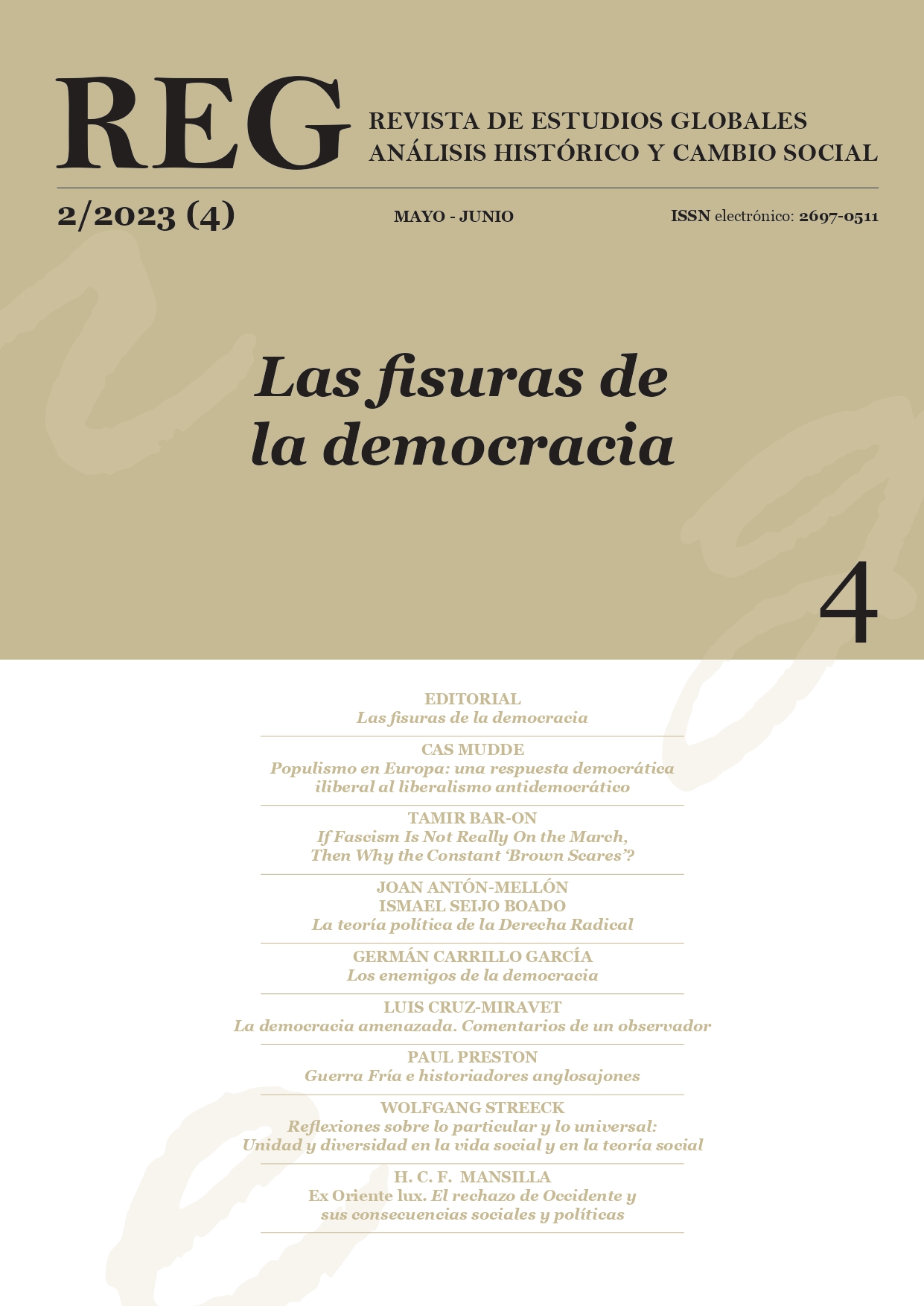¿Una nueva Marcha del Fascismo sobre Occidente?
Abstract
¿Qué es exactamente el fascismo? Los fascistas se veían a sí mismos como creadores de la unidad entre el capital y el trabajo y el fascismo como una ideología revolucionaria antiliberal, anticomunista y anticonservadora, que mezcla ideales ultranacionalistas antiliberales y marxistas revisionistas, y que nació durante las múltiples crisis de los años de entreguerras. Es un tipo de "socialismo" en nombre de la nación, que supuestamente renace tras un periodo de decadencia y declive. Los fascistas son, por tanto, anticapitalistas (y anticomunistas) y, por extensión, "antimaterialistas". Pretenden crear una comunidad nacional unificada, que no se vea desgarrada por las divisiones de las desigualdades capitalistas ni por el enfrentamiento comunista entre burguesía y proletariado. Los fascistas consideran que el liberalismo, el sistema parlamentario y los legados igualitarios y de derechos de las revoluciones estadounidense y francesa son individualistas y, por tanto, antitéticos a la causa primordial de la nación.
Downloads
Metrics
-
Abstract439
-
pdf (Español (España))248
References
Albright, Madeleine (with Bill Woodward) (2018). Fascism: A Warning. New York: HarperCollins.
Bale, Jeffrey M. (2017). The Darkest Side of Politics, I: PostWar Fascism, Covert Operations and Terrorism. New York: Routledge, 2017.
Bale, Jeffrey M. and Bar-On, Tamir (2022). Fighting the Last War: Confusion, Partisanship and Alarmism in the Literature on the Radical Right. Lanham, Maryland: Rowman and Littlefield.
Bardèche, Maurice (1961). Qu'est-ce que le fascisme? Paris: Les Sept Couleurs.
Bar-On, Tamir (2007). Where Have All The Fascists Gone? Aldershot: Ashgate.
BBC (2023). Hardtalk: Sergey Karagonov, February 2. Disponible en: https://www.bbc.co.uk/iplayer/episode/m001htfm/hardtalk-sergey-karaganov-chair-russias-council-for-foreign-and-defence-policy
Ben-Ghiat, Ruth (2022). The Return of Fascism in Italy. The Atlantic, September 23. Disponible en: https://www.theatlantic.com/international/archive/2022/09/giorgia-meloni-italy-election-fascism-mussolini/671515/
Boghossian, Peter and Shellenberger, Michael (2021). Woke Religion: A Taxonomy. November 11, 2021. https://boghossian.substack.com/p/woke-religion-a-taxonomy
Brzezinski, Zbigniew (2007). Second Chance: Three Presidents and the Crisis of American Superpower. New York: Basic Books.
Chermak, Steven M. (2022). Searching for a Demon: The Media Construction of the Militia Movement. Boston: Northeastern University.
Churchill, Robert H. (2009). To Shake Their Guns in the Tyrant’s Face: Libertarian Political Violence and the Origins of the Militia Movement. Ann Arbor, MI: University of Michigan.
Copsey, Nigel (2018). The Radical Right and Fascism. In Jens Rydgren (ed.), the Oxford Handbook of the Radical Right, 105-121. New York: Oxford University Press.
De la Cuadra, Fernando (2021). Bolsonaro y Kast: dos perfiles de una ultraderecha vernácula. Noticias Ser.Pe, October 20. https://www.noticiasser.pe/bolsonaro-y-kast-dos-perfiles-de-una-ultraderecha-vernacula
Di Caro, Martin (2022). History As It Happens: Semi-fascism? History As It Happens, September 14.Disponible en: https://www.washingtontimes.com/news/2022/sep/14/history-it-happens-semi-fascism/
Dinan, Stephen (2020). Revolutionary Communist Leader Backs Biden. Washington Times, August 3.
Finchelstein, Federico. (2020). A Brief History of Fascist Lies. Oakland: University of California Press.
Fine, Gary Alan (2007). The Construction of Historical Equivalence: Weighing the Red and Brown Scares. Symbolic Interaction 30 (1), 27-39.
Fukuyama, Francis (2002). Has History Started Again? Policy 18 (2), 3-7.
Fukuyama, Francis (1989). The End of History? The National Interest 16 (Summer), 3-18.
Ganser, Daniel (2005). NATO’s Secret Armies: Operation Gladio and Terrorism in Western Europe. London: Frank Cass.
Gentile, Emilio (2019). ¿Quién es fascista?, Madrid: Alianza Ed.
Gottfried, Paul (2021). Antifascism: The Course of a Crusade. Ithaca: Cornell University Press.
Gregor, A. James (2006). The Search for Neofascism: The Use and Abuse of Social Science. New York: Cambridge University Press.
Griffin, Roger (2018). Fascism. Cambridge, UK: Polity.
Hartman, Andrew (2018). Retrospective Roundtable on Leo Ribuffo’s Old Christian Right: Introduction. Society for U.S. Intellectual History, December. https://s-usih.org/2018/12/retrospective-roundtable-on-leo-ribuffos-old-christian-right-introduction/
Hussey, Andrew (2021). Éric Zemmour: the “TV-friendly fascist” who thinks he can be France’s next president. The New Statesman, September 29. Disponible en: https://www.newstatesman.com/international-politics/french-election-2022/2021/09/eric-zemmour-the-tv-friendly-fascist-who-thinks-he-can-be-frances-next-president
Lavine, Harold (1940). Fifth Column in America. New York: Doubleday.
Mammone, Andrea (2015). Transnational Neofascism in France and Italy. Cambridge: Cambridge University Press.
Matthews, Dylan (2020). Is Trump a fascist? 8 experts weigh in. Vox, October 23. Disponible en: https://www.vox.com/policy-and-politics/21521958/what-is-fascism-signs-donald-trump
McSherry, J. Patrice (2005). Predatory States: Operation Condor and Covert War in Latin America. Lanham, MD: Rowman and Littlefield.
Mearsheimer, John (2019). Bound to Fail: The Rise and Fall of the Liberal International Order. International Security 43 (4) (Spring 2019), 7-50.
Milevsky, Jonathan (2020). The terrible price of comparing Trump to Nazis. National Post, October 12. Disponible en: https://nationalpost.com/opinion/jonathan-milevsky-the-terrible-price-of-comparing-trump-to-nazis
Nelson, Cristopher, Paxson, Heather and Weiss, Brad (2021). Editors’ Forum: American Fascism. Society for Cultural Anthropology, April 15. Disponible en: https://culanth.org/fieldsights/series/american-fascism
O’Grady, Sean (2018). Before our eyes, Italy is becoming a fascist state. The Independent, October 16.
Payne, Stanley G. (2022a). The F-Word. First Things (December).
Payne, Stanley G. (2022b). Antifascists After Fascism. First Things 319 (January). Disponible en: https://www.firstthings.com/article/2022/01/antifascists-after-fascism
Payne, Stanley G. (1996). A History of Fascism, 1914–1945. Madison: University of Wisconsin Press.
Pirro, Andrea L.P. (2022). Performing (during) the Coronavirus Crisis: The Italian Populist Radical Right between National Opposition and Subnational Government. Government and Opposition, 1–17.
Rapoport, David C. (2022). Waves of Global Terrorism: From 1879 to the Present. New York: Columbia University Press.
Reich, Robert (2023). The modern Republican party is hurtling towards fascism. The Guardian, April 15. https://www.theguardian.com/commentisfree/2023/apr/15/the-modern-republican-party-fascism-robert-reich
Ribuffo, Leo P. (1983). The Old Christian Right: The Protestant Far Right from the Great Depression to the Cold War. Philadelphia: Temple University.
Schmitt, Carl (2007). The Concept of the Political (expanded edition) (trans. George Schwab). Chicago: University of Chicago Press.
Sternhell, Zeev. Neither Right Nor Left: Fascist Ideology in France. Princeton, NJ: Princeton University, 1996.
Tasker, John Paul (2022). Trudeau accuses Conservative MPs of standing with ‘people who wave swastikas. CBC News, September 17. Disponible en: https://www.cbc.ca/news/politics/trudeau-conservative-swastikas-1.6354970
Taylor, Adam (2015). French courts: Yes, it’s okay to call Marine le Pen a fascist or worse. The Washington Post, March 20. Disponible en: https://www.washingtonpost.com/news/worldviews/wp/2015/03/20/french-courts-yes-its-okay-to-call-marine-le-pen-a-fascist-or-worse/
Tharoor, Ishaan (2020). Is it time to call Trump the F-word? The Washington Post, June 3.
Traverso, Enzo (2021). Las nuevas caras de la derecha. ¿Por qué funcionan las propuestas vacías y el discurso enfurecido de los antisistema y cuál es su potencial político?, Madrid: Capital Intelectual Ed.
Wieviorka, Michel (2019). The Specificities of Researching Evil, in Emanuele Toscano (ed.), Researching Far-Right Movements: Ethics, Methodologies, and Qualitative Inquiries (Routledge), 13-22.
Copyright (c) 2023 Revista de Estudios Globales. Análisis Histórico y Cambio Social

This work is licensed under a Creative Commons Attribution-NonCommercial-NoDerivatives 4.0 International License.










